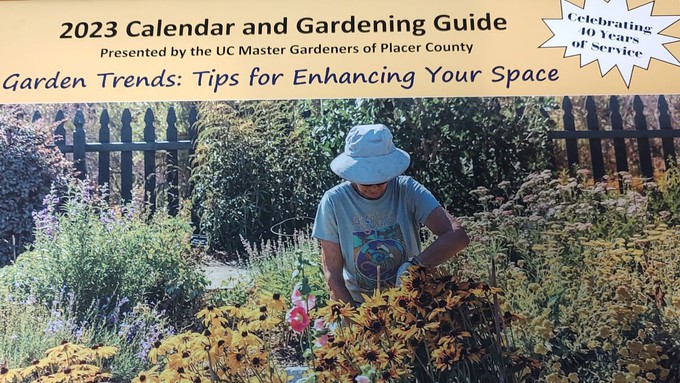
Placer County Master Gardeners present 'Garden Trends' and lots of seasonal advice

The 2023 Placer County Master Gardeners calendar and gardening guide is devoted to current "Garden Trends." Debbie Arrington
How can you do a better job growing vegetables, fruit, flowers and more? Plan ahead.
For that task, a printed calendar still comes in handy – especially when it’s packed with advice and handy tips.
Now available is the 2023 Calendar and Gardening Guide, created by the UC Master Gardeners of Placer County.
Priced at $12, the 13-month calendar is available at several nurseries and gardener-friendly locations in Placer, Nevada and El Dorado counties. Check the website https://pcmg.ucanr.org/2023_Calendar/ for an updated list of locations to buy the calendar or to order direct.
It’s one of the best bargains local gardeners can find – and it will give you a head start on gardening success in the year ahead.
“In recent years, there has been a surge in people interested in growing their own food,” says Paula Agostini, co-chair of the master gardeners’ calendar committee, “and this calendar taps into that enthusiasm and can help Northern Californians, from beginners to experts, create, grow, and harvest a healthy sustainable garden.”
Written specifically for foothill gardeners, the Placer County calendar and guide is very useful for any gardener in the greater Sacramento area including flatlanders.
The 2023 theme: “Garden Trends: Tips for Enhancing Your Space.” Featuring planting, growing and harvesting tips, the calendar and guide includes in-depth articles for every season. Among the topics: Fruit trees ideal for small spaces; planting for pollinators; create a fragrant garden; how to grow cut flowers; vegetables that can withstand triple-digit heat; and how to replace your lawn.
Get advice on what to plant when as well as what to expect to find in local farmers markets.
A major fundraiser for the master gardeners, the publication “is one of the important ways we deliver valuable information on gardening to the community,” says Agostini.
It’s also beautiful, with gorgeous local photos every month. (Did we mention this calendar makes a great gift?)
Placer County Master Gardeners will be selling calendars at local events including the Auburn Farmers Market (first and third Saturdays through Oct. 15), Roseville Fountains Farmers Market (Tuesdays through Oct. 25) and the Mountain Mandarin Festival, Nov. 18-20.
Details: https://pcmg.ucanr.org/
Comments
0 comments have been posted.Sacramento Digs Gardening to your inbox.
Food in My Back Yard Series
May 6: Maintain soil moisture with mulch for garden success
April 29: What's (already) wrong with my tomato plants?
April 22: Should you stock up on fertilizer? (Yes!)
April 15: Grow culinary herbs in containers
April 8: When to plant summer vegetables
April 1: Don't be fooled by these garden myths
March 25: Fertilizer tips: How to 'feed' your vegetables for healthy growth
March 18: Time to give vegetable seedlings some more space
March 11: Ways to win the fight against weeds
March 4: Potatoes from the garden
Feb. 25: Plant a fruit tree now -- for later
Feb. 18: How to squeeze more food into less space
Feb. 11: When to plant? Consider staggering your transplants
Feb. 4: Starting in seed starting
Sites We Like
Garden Checklist for week of May 11
Make the most of the lower temperatures early in the week. We’ll be back in the 80s by Thursday.
* Plant, plant, plant! It’s prime planting season in the Sacramento area. Time to set out those tomato transplants along with peppers and eggplants. Pinch off any flowers on new transplants to make them concentrate on establishing roots instead of setting premature fruit.
* Direct-seed melons, cucumbers, summer squash, corn, radishes, pumpkins and annual herbs such as basil.
* Harvest cabbage, lettuce, peas and green onions.
* In the flower garden, direct-seed sunflowers, cosmos, salvia, zinnias, marigolds, celosia and asters. (You also can transplant seedlings for many of the same flowers.)
* Plant dahlia tubers.
* Transplant petunias, marigolds and perennial flowers such as astilbe, columbine, coneflowers, coreopsis, dahlias, rudbeckia and verbena.
* Keep an eye out for slugs, snails, earwigs and aphids that want to dine on tender new growth.
* Feed summer bloomers with a balanced fertilizer.
* For continued bloom, cut off spent flowers on roses as well as other flowering plants.
* Add mulch to the garden to maintain moisture. Mulch also cuts down on weeds. But don’t let it mound around the stems or trunks of trees or shrubs. Leave about a 6-inch-to-1-foot circle to avoid crown rot or other problems.
* Remember to weed! Pull those nasties before they set seed.
* Water early in the day and keep seedlings evenly moist.